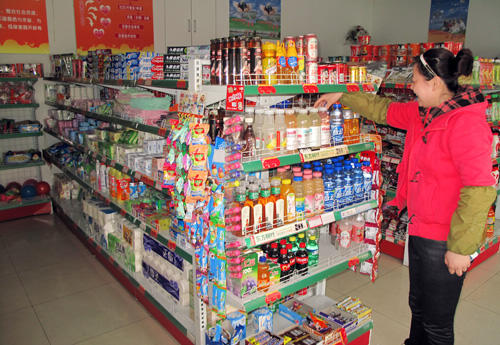|
 |
|
WAITING FOR CUSTOMERS: A clerk checks commodities on a shelf at a thrift shop in Jilin City, northeast China's Jilin Province (CFP) |
While the sagging economy in the United States has sent customers flocking to thrift shops, boosting sales for the not-for-profit organizations that operate these retail establishments, their counterparts in China are still struggling to establish themselves.
Compared with Boston-based Morgan Memorial Goodwill Industries, which has a history of 110 years, the thrift shop is a novel concept in China. Most cities did not have one until a national campaign of establishing such shops in large and medium-sized cities was funded by the government in 2004.
Low-income families entitled to living allowances receive gift cards that allow them to purchase goods at thrift shops. While the initial merchandise available at these shops were purchased with government funds, the government expected that a steady flow of donations from individuals and businesses would sustain the survival of these shops in the long run.
However, many of these shops around China are either closed or without customers.
Jinan, capital of east China's Shandong Province, had its first thrift shop open in January 2004. There were as many as 36 stores at the peak of the city's frenzy of establishing more facilities. Now 21 stores have witnessed increased business while most of the remainder are struggling for survival.
According to locally published Dazhong Daily, the remaining thrift shops in Jinan have mostly followed three development models. A small number run successfully as social enterprises and turn in profits. Besides paying the rent and bills, part of their profits are used as subsidies for extremely poor families. Others only sell basic daily necessities to low-income families. Still others have become outlets of large supermarkets, where low-income families can purchase items with government-distributed shopping cards. The government pays the customers' bills by transferring the money directly to the operators.
Left to fail
Jinan's earliest thrift shop, which has a 400-square-meter shopping area, is operated by the Jinan Charity Federation. Now it has empty aisles on any given day, even with neatly arranged racks, a wide range of goods and dozens of promotion banners everywhere. In contrast, a supermarket only 200 meters away is buzzing with customers combing through racks to find ideal goods.
Each variety of merchandise in this thrift shop has three price tags: The highest price is a charitable price for ordinary people who can afford to pay more; the middle price is the market price; the lowest price is for shoppers entitled to government living allowances. Most proceeds go directly into charity funds to support low-income groups.
"Many residents think that a thrift shop is only for the poor and don't sell to ordinary consumers. If we have more customers, we could make ends meet and even turn in a profit," Zhang Rui, Manager of the shop, told China National Radio. Zhang said that the extremely low customer flow had hampered its designed function as a new form of donation platform.
According to Zhang, the Jinan Charity Federation has been trying to transform the current operational model by partnering with a large supermarket chain in the city and finding more sponsorship companies, but these efforts have made little progress.
| 